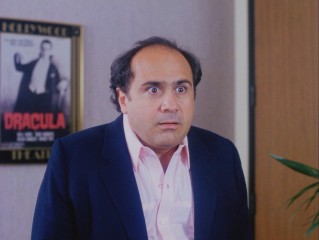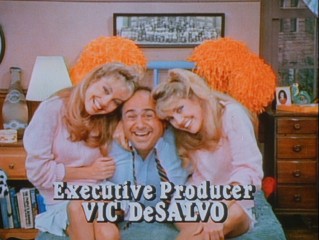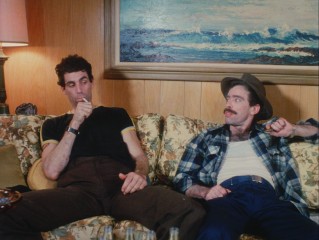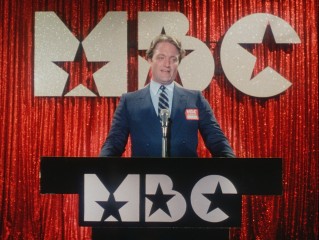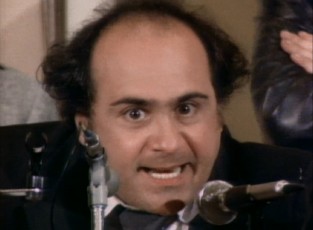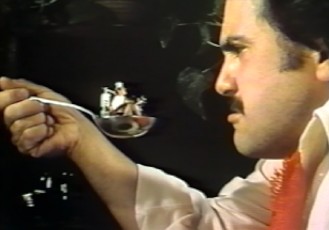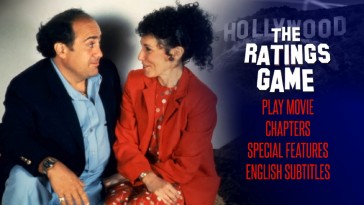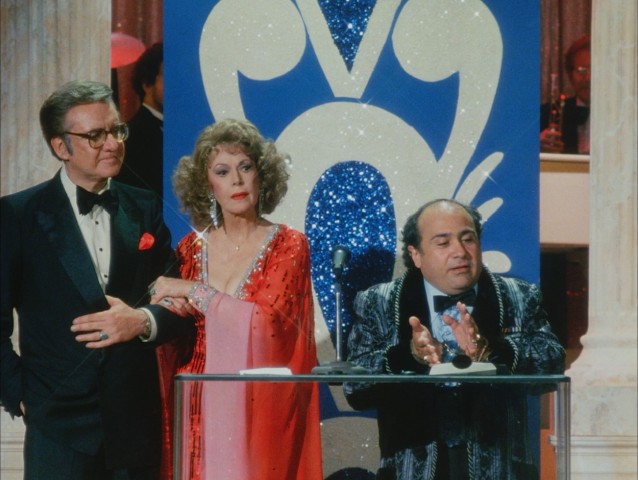The Ratings Game: Digitally Remastered Special Edition Blu-ray Review
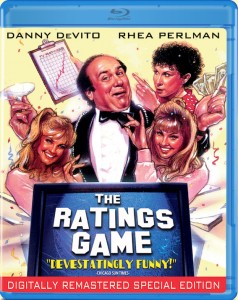 |
The Ratings Game Movie & Blu-ray Disc Details Director: Danny DeVito / Writers: Jim Mullholland, Michael Barrie Cast: Danny DeVito (Vic DeSalvo), Rhea Perlman (Francine Kestler), Gerrit Graham (Parker Braithwaite), Bernadette Birkett (Mrs. Sweeney), Barry Corbin (The Colonel), Louis Giambalvo (Goody DeSalvo), Ronny Graham (Cap'n Andy), Huntz Hall (Benny Bentson), Basil Hoffman (Frank Friedlander), Kevin McCarthy (Wes Vandergelder), John Megna (Al), Michael Richards (Sal), Ron Rifkin (T.V. Director), Joe Santos (Tony), Vincent Schiavelli (Skip), Fred Scialla (Richie DeSalvo), Frank Sivero (Bruno), Daniel Stern (Skip Imperali), Mark L. Taylor (Ken), George Wendt (Mr. Sweeney), Steve Allen (Himself), Jayne Meadows (Herself), Candi Brough (Bambi), Randi Brough (Stacy), Robert Costanzo (Nunzio), Michael Ensign (Le Boeuf Maitre d'), Jason Hervey (Todd Sweeney), Damon Hines (Woodrow T. Brown), Jerry Seinfeld (Network Rep), Tracey Walter (Computron Investigator - uncredited), Alan Alda (Himself - uncredited), Roy Firestone (Himself - uncredited) Original Air Date: December 15, 1984 / Running Time: 102 Minutes / Rating: Not Rated 1.33:1 Original Aspect Ratio / 2.0 DTS-HD MA (English) Subtitles: English for Hearing Impaired / Not Closed Captioned Blu-ray Release Date: July 19, 2016 / Suggested Retail Price: $29.95 Also available on DVD ($24.95 SRP) Single-sided, dual-layered disc (BD-50) / Blue Keepcase |
Buy The Ratings Game from Amazon.com: Blu-ray • DVD
In between his five-season run on the decorated sitcom "Taxi" and the movie stardom he enjoyed in the 1980s, Danny DeVito made his feature directing debut on The Ratings Game, a 1984 Showtime television movie.
DeVito also stars as Vic DeSalvo, a schlub from New Jersey whose family's trucking business made him rich. Now living large out in sunny California, Vic wants to break into show business, When the lead actor walks out, Sal has to assume the starring role of this series, improbably playing a Princeton student who is assigned to share a dorm room with two gorgeous co-eds. It's a rubbish show, one that the studio audience (largely comprised of Vic's family and friends) loves and MBC executives hate. They plan to bury the program by scheduling its premiere against the World Series, saying they'll only pick up the series if the pilot pulls off a far-fetched ratings win that night.
Fortunately, Vic has a valuable ally in Francine Kestler (DeVito's then and still wife Rhea Perlman), a Jersey girl who is a thankless employee of Computron, the leading supplier of television viewership ratings. Francine explains to Vic how it's not about having the right number of viewers but the right viewers, those randomly-selected families whose viewership is logged as a representation of the public at large. So, Vic stages a sweepstakes cruise for all of the Computron households and hires a bunch of his cronies to break into their houses while they're gone and watch his stupid sitcom instead of the World Series.
After that brilliant, diabolical plan pays off, MBC's highest honchos orders more episodes of "Sittin' Pretty" to fill the air for the next twenty-two weeks and also greenlights other programs from Vic's mind, including an animated series called "The Goombas." To avoid cancellation, Vic has to have his teamsters keep occupying those ratings households while the owners' cruise is extended considerably.
The Ratings Game is a funny movie full of on-target satire of 1980s television and the industry making it. Between "Taxi" and "Cheers", this world of upfronts and ratings was one that DeVito and Perlman were plenty familiar with and they know how to skewer the business. The creative plot is grounded in reality, too, and anyone who has questioned the methods and accuracy of the Nielsens should appreciate the way in which they are sent up and manipulated here.
The only real problem with the movie is that it runs about fifteen minutes longer than it needs to, dragging a little while depicting Vic's improbable success and then the obstacles standing in the way of sustaining it. The Ratings Game includes some celebrity cameos in its climactic TV Digest Awards, with appearances by the likes of Alan Alda and, more prominently, Steve Allen. This telemovie is also notable for containing one of the few non-"Seinfeld" roles of Jerry Seinfeld, who gets seven seconds of screentime as an unreceptive CBS executive. His "Seinfeld" neighbor Michael Richards has a slightly bigger role as one of the ratings house occupiers. Despite airing on Showtime, this movie features very little profanity and remains quite tame as far as off-color content goes.
The Ratings Game simultaneously made its long overdue DVD debut and pleasantly surprising Blu-ray debut this week from Olive Films, who have branded both releases "Digitally Remastered Special Edition."
VIDEO and AUDIO
The Ratings Game has a tiny bit of wear and tear, but considering the state of other 1980s television, this is quite great. Retaining its original 1.33:1 aspect ratio, the movie is sharp and save for some minor imperfections, quite clean. The 2.0 DTS-HD master audio track keeps dialogue exceptionally crisp and clear as well. English SDH subtitles are kindly supplied on the feature (but not the extras).
BONUS FEATURES, MENUS, PACKAGING and DESIGN
The Blu-ray's extras, all encoded in HD though obviously not produced for it, begin with a collection of four short films directed by Danny DeVito prior to The Ratings Game.
The Selling of Vince D'Angelo (20:37, 1983) stars DeVito as a clearly unqualified working class cement man who declares his campaign to run for senator of New Jersey. In A Lovely Way to Spend an Evening (13:48, year unknown), a New Jersey poolhall fight that spills into plain sight is not what it appears to be, but it nonetheless does not end well for the pranksters. George Wendt, John Ratzenberger, and Tony Danza all feature among the community members, while To Kill a Mockingbird's John Megna is a catalyst among the crew.
The next two shorts are less polished and more experimental than those first two, which were both produced for HBO/Cinemax's "Likely Stories" anthology.
The Fellini-esque 35mm Minestrone (11:51, 1976) sees a tiny photographer showing up in the soup of an Italian man with filmmaking aspirations.
The oldest and strangest of the lot, black and white 16mm The Sound Sleeper (11:52, 1973), attributed to both De Vito and Perlman, finds a woman getting fixed up and picking up a man whom she kills while sleeping with before flying home to her husband and cat.
The remaining three bonus features are more directly related to The Ratings Game.
First up comes a reel of three deleted scenes (6:03). The most significant of these has MBC executive Braithwaite (Gerrit Graham) visiting a psychic played by Lainie Kazan. It's followed by a couple of takes of Vic and Francine's A behind-the-scenes featurette (6:50) gives us some insight into the production, with interviews of DeVito and Perlman complementing clips and a tiny bit of location B-roll.
Finally, we get Showtime's basic extended promo (1:41) for the movie.
One additional item is found inside the case: a booklet to rival one of The Criterion Collection's better companions. This 28-page booklet is full of pictures and words. It offers a one-page write-up about the movie's creation and disappearance, critics' quotes, a complete credits list, quotes with corresponding frame grabs, storyboards and effects information, and even a page on each of the bonus shorts included.
Though the scored, static menu appears to be a basic affair, it displays creativity in the images with which it expands when sections are selected.
CLOSING THOUGHTS
Though the business has changed dramatically in the past 32 years, The Ratings Game endures as a witty send-up of network television practices. Olive Films' Blu-ray release delights with its nice-looking feature presentation and abundance of bonus features for which we seem to have the unusually home video-savvy DeVito to thank. It's a recommended platter for a movie that deserves to escape the obscurity it has experienced these past decades.
|
Related Reviews:
DVDizzy.com | DVD and Blu-ray Reviews | New and Upcoming DVD & Blu-ray Schedule | Upcoming Cover Art | Search This Site
DVDizzy.com Top Stories:
Directed by Danny DeVito: Matilda
Starring Danny DeVito: It's Always Sunny in Philadelphia: The Complete Season 8 • Dr. Seuss' The Lorax • Hercules
More DeVito: John Grisham's The Rainmaker • Deck the Halls • When in Rome • Solitary Man
Television Satire: Scrooged • The TV Set • The Barefoot Executive
1980s Comedies: Zapped! • Used Cars • The Naked Gun • Planes, Trains & Automobiles
New to Disc: Elvis & Nixon • Gang Related • Batman v Superman: Dawn of Justice
Text copyright 2016 DVDizzy.com. Images copyright 1984 Showtime, Imagination/Newstreet Productions and 2016 Olive Films.
Unauthorized reproduction prohibited.
